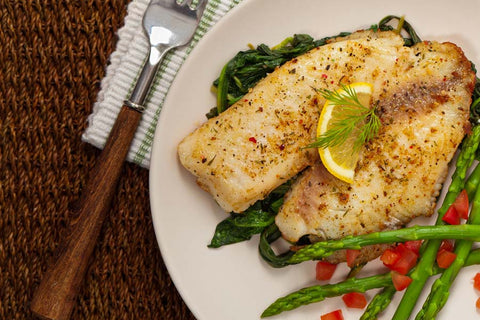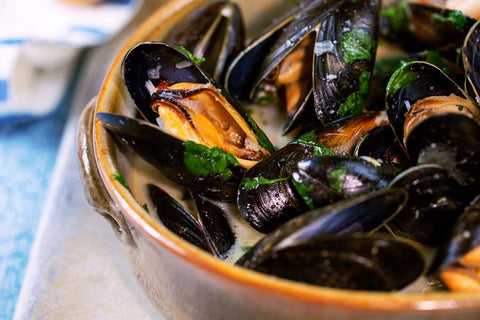Seafood can be an essential component of a healthy, well-balanced breastfeeding diet, as its nutrition profile contains high levels of protein, omega-3 fatty acids, vitamins, and minerals, crucial for both the breastfeeding mother and baby's health. But what about seafood? Can you eat seafood when breastfeeding?
It’s paramount for mothers to practice conscious consumption, considering both the benefits and potential concerns and risks associated with seafood nutrition. Common apprehensions revolve around the mercury contents and contaminants, emphasizing the need for well-informed decision-making.
In this article, we’ll elaborate on the nutritional benefits of seafood and provide you with whether seafood should be considered as an option during breastfeeding. More importantly, how can eating seafood affect breast milk?

Source: shutterstock.com / Photo Contributor: alisafarov
Can You Eat Seafood When Breastfeeding
So, is it ok to eat seafood when breastfeeding? It’s generally safe to eat seafood while breastfeeding. However, you should be mindful of mercury levels and opt for low-mercury options.
When it comes to nourishing yourself and your baby during breastfeeding, seafood emerges as an excellent choice for balancing a healthy diet. It offers an abundance of essential vitamins and minerals with a rich nutrition profile. The mother’s diet is the primary source of mercury exposure for most infants, meaning that the mother's food is passed to her infant through breast milk.
As a breastfeeding mother, we recognize that you want the best for your baby. That’s why we’re proud to offer some of the freshest healthy seafood boxes, specially selected with your health in mind.
Our fish are not only high in protein and low in saturated fat, but they also contain vital components, such as iodine, vitamin D, docosahexaenoic acid (DHA), and omega-3 fatty acids. These nutrients support the overall well-being of your little one, contributing to the baby’s nervous system development, brain, and eyes through breast milk while also preventing heart diseases.
Additionally, seafood is rich in digestible proteins, amino acids, iron, vitamin 12, and various minerals, further enhancing its nutritional value for both the baby and the mother during breastfeeding.
Safe seafood choices for breastfeeding mothers
So, which fish is good for feeding mother?
When it comes to seafood, mothers have a myriad of safe, delicious options available at our shop, providing a diverse range of nutrition and minerals to incorporate into their diet. Some of the best seafood sources for breastfeeding parents are low in mercury, so we can recommend the following:
- Salmon
- Tilapia
- Catfish
- Mussels
- Trout
- Sardines
- Herring
- Light Tuna
- Shrimp
- Crab
- Squid
-
Lobster
You can safely enjoy a variety of these delicious seafood meals two to three times a week, which is equivalent to around 8 to 12 ounces, while you are breastfeeding.
Concerns About Mercury and Contaminants
When crafting your nutritious diet during breastfeeding, there are several precautions you should consider when incorporating fish products. This includes any type of fish that has higher levels of toxins and other pollutants, like mercury, which is found in nearly all fish and is the biggest concern when eating fish.
These contaminants are naturally occurring elements that become airborne through the burning of coal, oil, and wood as fuel, potentially building up in seafood, especially larger fish people often eat. As mercury is often associated with several health risks, it could particularly be a concern that may harm brain development at relatively low levels and may be considerably toxic to adults and youngsters.
Although the levels of these contaminants are low enough that the health advantages and benefits of fish consumption outweigh the risks of health effects, it’s critical for breastfeeding women to choose the seafood they eat with extra caution. You can further limit exposure to mercury by opting for different types of fish with low toxins, as all of them have distinctive levels of pollutants.

Source: shutterstock.com / Photo Contributor: Magdanatka
Seafood to avoid or limit when breastfeeding
Mercury contents can greatly vary depending on the type of fish, location, and level of pollution in water, as well as the age and size of the fish. So, if a fish preys on smaller fish that contain mercury and other pollutants, the contamination can accumulate more in that fish. This means that larger fish may exhibit much higher mercury levels; therefore, it's advisable to avoid consuming them when breastfeeding. This could include species such as:
- King Mackerel
- Swordfish
- Tilefish
- Orange Roughy
- Marlin
Conclusion
So, can you eat seafood when breastfeeding?
In conclusion, maintaining a balanced diet during the crucial time of breastfeeding is paramount for your health and your little one’s development phase. While seafood has a powerful nutrition profile with high levels of protein, omega-3 fatty acids, vitamins, and minerals, it’s important to be mindful of the potential risks associated with certain types of fish.
However, there are plenty of safe seafood options that not only fill your plate but also provide numerous nutritious elements without compromising either your or your baby’s health. This can include anything from low-mercury fish like salmon and trout to shellfish, such as shrimp and crab.





